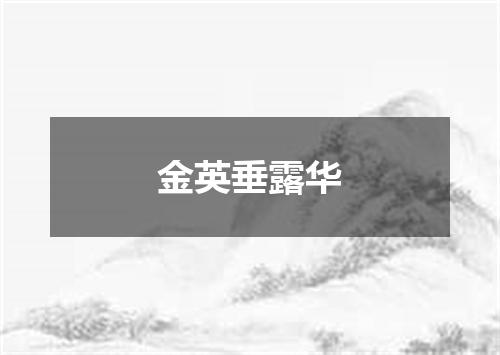“金英垂露华”出自宋代周邦彦的《醉桃源(大石·第二)》,诗句共5个字,诗句拼音为:jīn yīng chuí lù huá,诗句平仄:平平平仄平。
“金英垂露华”全诗:
菖蒲叶老水平沙。
临流苏小家。
画阑曲径宛秋蛇。
金英垂露华。
烧蜜炬,引莲娃。
酒香薰脸霞。
再来重约日西斜。
倚门听暮鸦。
《醉桃源(大石·第二)》是一首宋代的诗词,作者是周邦彦。以下是诗词的中文译文、诗意和赏析:
中文译文:
菖蒲叶老水平沙。
临流苏小家。
画阑曲径宛秋蛇。
金英垂露华。
烧蜜炬,引莲娃。
酒香薰脸霞。
再来重约日西斜。
倚门听暮鸦。
诗意:
这首诗描绘了一个宁静美丽、令人陶醉的桃花源。桃花源指的是一个隐居人世、与世隔绝的理想之地。诗中通过描写桃花源中的景物和情境,表达了作者对这个世外桃源的向往和追求。诗词中融入了自然景色、人物形象和意境描写,展现出对自然和闲适生活的向往与热爱。
赏析:
1. 第一句“菖蒲叶老水平沙”,描绘了菖蒲叶子在水面上摇曳的景象,寓意自然的老迈与河滩上水平的沙地。这一句通过对自然景物的描写,传达出宁静与岁月流转的感觉。
2. 第二句“临流苏小家”,描述了作者临近水流住着的小屋,流苏可能指屋檐上的装饰物。这里展示了作者隐居的生活环境,与自然和谐共处。
3. 第三句“画阑曲径宛秋蛇”,以画阑和曲径比喻宁静的环境,宛秋蛇则描绘了蜿蜒曲折的小径,营造出一种幽静的意境。
4. 第四句“金英垂露华”,金英指桃花,垂露华则是指桃花上的露水。这一句通过描绘露水滴落在桃花上的美景,增添了自然的清新和生命的活力。
5. 第五句“烧蜜炬,引莲娃”,烧蜜炬可能指的是燃烧的蜂蜜烛,莲娃则是指莲花的娇艳。这一句描绘了桃花源中的热闹景象,融入了节日喜庆的氛围。
6. 第六句“酒香薰脸霞”,表达了桃花源中酒香扑鼻的情景,融合了人与自然的交融。
7. 最后两句“再来重约日西斜,倚门听暮鸦”,表达了作者再次约会时太阳西斜、倚门聆听暮鸦的场景,展现了作者享受宁静生活的态度和心境。
整首诗以描绘桃花源中的自然景物和情境为主线,通过细腻的描写和意境的营造,展示了作者对自然与宁静生活的向往。这首诗既具有浪漫主义的情感表达,又融入了宋代诗词的清新和自然《醉桃源(大石·第二)》 is a poem from the Song Dynasty, written by Zhou Bangyan. Here is the Chinese translation, the poetic meaning, and an analysis of the poem:
Chinese Translation:
菖蒲叶老水平沙。
临流苏小家。
画阑曲径宛秋蛇。
金英垂露华。
烧蜜炬,引莲娃。
酒香薰脸霞。
再来重约日西斜。
倚门听暮鸦。
Poetic Meaning:
This poem depicts a tranquil and enchanting peach blossom paradise. Peach Blossom Paradise refers to an ideal place of seclusion and detachment from the world. Through the depiction of the scenery and setting in Peach Blossom Paradise, the poet expresses his yearning and pursuit of this idyllic sanctuary. The poem incorporates descriptions of natural landscapes, characters, and imagery, revealing the poet's longing for and love of nature and a leisurely life.
Analysis:
1. The first line, "菖蒲叶老水平沙" (The old cattail leaves on the flat sand), portrays the swaying of cattail leaves on the water's surface, symbolizing the aging of nature along the flat sand. This line conveys a sense of tranquility and the passage of time through the description of natural elements.
2. The second line, "临流苏小家" (Living by the flowing stream, a small home), describes the poet's dwelling near the flowing stream, with "流苏" possibly referring to decorative elements on the eaves. It showcases the poet's harmonious coexistence with nature in his secluded living environment.
3. The third line, "画阑曲径宛秋蛇" (A winding path like a meandering autumn snake beside the painted porch), uses the painted porch and winding path as metaphors for a peaceful environment. The imagery of a meandering autumn snake creates a serene atmosphere.
4. The fourth line, "金英垂露华" (Golden flowers dripping with dew), uses "金英" to refer to peach blossoms and "垂露华" to describe the dewdrops on the flowers. This line depicts the beauty of dewdrops on peach blossoms, adding a sense of freshness and vitality to nature.
5. The fifth line, "烧蜜炬,引莲娃" (Burning honey candles, attracting lotus fairies), possibly describes the festive scene in Peach Blossom Paradise. The honey candles and lotus fairies evoke a sense of celebration and joy.
6. The sixth line, "酒香薰脸霞" (The fragrance of wine perfumes the rosy cheeks), conveys the scent of wine permeating the air in Peach Blossom Paradise, blending the essence of humans and nature.
7. The last two lines, "再来重约日西斜,倚门听暮鸦" (Come again when the sun tilts to the west, leaning against the door to listen to the evening crows), express the scene of meeting again as the sun sets in the west, with the poet leaning against the door, listening to the crows of dusk. It portrays the poet's attitude and state of enjoying a peaceful life.
The entire poem revolves around the depiction of natural scenery and situations in Peach Blossom Paradise. Through delicate descriptions and the creation of imagery, the poet showcases his yearning for nature and a tranquil life. This poem embodies romantic expressions while incorporating the freshness and naturalness characteristic of Song Dynasty poetry.
zuì táo yuán dà shí dì èr
醉桃源(大石·第二)
chāng pú yè lǎo shuǐ píng shā.
菖蒲叶老水平沙。
lín liú sū xiǎo jiā.
临流苏小家。
huà lán qū jìng wǎn qiū shé.
画阑曲径宛秋蛇。
jīn yīng chuí lù huá.
金英垂露华。
shāo mì jù, yǐn lián wá.
烧蜜炬,引莲娃。
jiǔ xiāng xūn liǎn xiá.
酒香薰脸霞。
zài lái zhòng yuē rì xī xié.
再来重约日西斜。
yǐ mén tīng mù yā.
倚门听暮鸦。
拼音:jīn yīng chuí lù huá
平仄:平平平仄平
韵脚:(平韵) 下平六麻 (仄韵) 去声二十二祃
 周邦彦(1056年-1121年),中国北宋末期著名的词人,字美成,号清真居士,汉族,钱塘(今浙江杭州)人。历官太学正、庐州教授、知溧水县等。徽宗时为徽猷阁待制,提举大晟府。精通音律,曾创作不少新词调。作品多写闺情、羁旅,也有咏物之作。格律谨严。语言典丽精雅。长调尤善铺叙。为后来格律派词人所宗。旧时词论称他为“词家之冠”。有《清真集》传世。
周邦彦(1056年-1121年),中国北宋末期著名的词人,字美成,号清真居士,汉族,钱塘(今浙江杭州)人。历官太学正、庐州教授、知溧水县等。徽宗时为徽猷阁待制,提举大晟府。精通音律,曾创作不少新词调。作品多写闺情、羁旅,也有咏物之作。格律谨严。语言典丽精雅。长调尤善铺叙。为后来格律派词人所宗。旧时词论称他为“词家之冠”。有《清真集》传世。
周邦彦神宗时为太学生,因歌颂新法被擢为太学正,累官庐州教授、知溧水县等。他少年时期个性比较疏散,但相当喜欢读书,宋神宗时,他写了一篇《汴都赋》,赞扬新法,徽宗时为徽猷阁待制,提举大晟府。周邦彦晚年与蔡京同党刘昺(注 此字上日下丙 音bǐng) 过从甚密名节有污。精通音律,曾创作不少新词调。作品多写闺情、羁旅,也有咏物之作。格律谨严,语言曲丽精雅。长调尤善铺叙。为后来格律派词人所宗。旧时词论称他为“词家之冠”“词中老杜”。有《清真居士集》,后人改名为《片玉集》。
历官太学正,国子主簿,徽猷阁待制,提举大晟府(管理音乐的机构)。诗词文赋,无所不擅。但为词名所掩,诗文多零落不传。其中《汴都赋》为成名之作,长7000字,流传至今。古体诗《天赐白》、《过羊角哀左伯桃墓》风骨凛然,绝无绮罗香泽之气。周邦彦被公认为是“负一代词名”的词人,在宋代影响甚大。邦彦词多写男女恋情,咏物怀古,羁旅行役,内容较窄,境界不高。但在艺术创意上堪称大家,其词善于铺叙,即在写景抒情中渗入述事,造成另一境界,形成曲折回环,开阖动荡,抑扬顿挫之势,发展了柳永、张先的慢词。加之语言工丽,多用典故,形成了浑厚、典雅、缜密的艺术风格。代表作如:〔少年游〕“并刀如水”,在寥寥51字中,不但写故事,重现当时的境界,而且写对话,如见词中之人,且闻其语,生动地描摹出人物的性格、心态,在词中实为独创。另一首〔少年游〕“朝云漠漠散轻丝”,写得更妙。一首小令写了两个故事,中间只用“而今丽日明金屋”一句联起来,将上阕的追忆恋爱与下阕的共同生活、金屋藏娇两种境界进行了比较,感受追忆两个故事中的同一种情调:相聚不如相思,意味深长。另如长调〔花犯〕“粉墙低”,跳跃曲折,照应、收放、开合,十分讲究;〔过秦楼〕“水浴清蟾”,将时间、地点、人物、感情变换数次,构成全部事件、人物感情发展的脉络;〔兰陵王〕《柳》,把将离之情,既去之思,居者与行者,旧恨与新愁,人和物,情和境,浑然融为一气。邦彦词音律严整,格调精工,多创新调。因此他被尊为婉约派的集大成者和格律派的创始人,开南宋姜夔、吴文英格律词派先河。周邦彦的集子有杨泽民、方千里、陈允平三家和词,今存《片玉词》10卷,《彊邨丛书》本;另有《清真集》2卷,集外词1卷,《四印斋所刻词》本。
周邦彦名字取自《诗经》的《国风·郑风·羔裘》“邦之彦兮”,译为国家有才华的人。王国维《人间词话》称:“美成深远之致,不及欧、秦,唯言情体物,穷极工巧,故不失为第一流之作者,但恨创调之才多,创意之才少耳。”可见其也是一位很有才学的人。
王国维认为:“(周)先生于诗文无所不工,然尚未尽脱古人蹊径。平生著述,自以乐府为第一。词人甲乙,宋人早有定论。惟张叔夏(张炎)病其意趣不高远。然宋人如欧、苏、秦、黄,高则高矣,至精工博大,殊不逮先生。故以宋词比唐诗,则东坡似太白,欧、秦似摩诘,耆卿似乐天,方回、叔原则大历十子之流。南宋唯一稼轩可比昌黎,而词中老杜,则非先生不可。昔人以耆卿比少陵,未为犹当也。"意谓周邦彦为北宋词的“集大成者”。
周邦彦词的"集大成",可以从三个方面来看,从词的搜求、审定、考证方面来说,他有集成和创制的功劳;就其写作功力之成就而言,他善于体物言情,描绘工巧周至,又善于融化前人诗句,炼字妥帖工整;从创作风格来说,清真词能集北宋词自柳永到秦观、贺铸等人之成就而独具特色。他发展了柳永以赋为词的铺叙手法,兼取秦词的柔婉、贺词的艳丽,综合形成自己善于勾勒,妙于剪裁,精巧工丽的典雅作风。